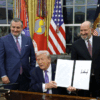If the experience of our closest allies in the war against terrorists is any indication, taking a pure law enforcement approach is dangerous, ill-advised, and might not bear much fruit. In the United Kingdom, of the 1,471 individuals arrested for alleged terrorist acts since September 11, 2001, only 340 suspects were charged with a terrorism-related crime. Of those 340 charged, only 196 terrorists were convicted. That means that the UK only achieved a 14% conviction rate for terrorism-related crimes.
Things aren’t any better in the Netherlands where of the 153 individuals arrested for terrorism-related crimes since 9/11, 44 individuals were charged and only 20 individuals were convicted of terrorism, or just 13%.
There are several factors that make it more difficult to obtain convictions in terrorism cases. First, prosecutors must balance the protection of intelligence sources and means against the need to present evidence in the courtroom. This balance is why some suspects are released or charged with lesser offenses or non-terrorism offenses such as fraud. Next, unlike other crimes, once a potential terrorism plot is detected, it is a judgment call as to when the threat becomes a clear and present danger thereby forcing law enforcement to intercept the plot and arrest the suspected terrorists.
If this judgment call is made too early, then the ability of law enforcement to collect and preserve the evidence needed to obtain a conviction can be compromised. Finally, there is a fine line between when actions are legally protected, such as the First Amendment protections around speech and association, and when actions are illegal, such as inciting violence or planning to commit a terrorist act. For juries, deciding beyond a reasonable doubt when a defendant crossed over the razor’s edge to illegality can be incredibly hard to do. As the Obama Administration shifts how the U.S. deals with terrorists from a military standpoint to a law enforcement standpoint — the latest shift coming with the reading of Miranda Rights to terrorists in Afghanistan — learning lessons from the experiences of our closest allies would be prudent.
If we fail to do so, especially as President Obama moves to close Gitmo and try many detainees in U.S. courtrooms, we run the risk of losing those court cases (failure to prove guilt beyond a reasonable doubt does not, therefore, mean that the defendant is in fact innocent) and watching as those who wish to harm us are freed and return to their Islamist terrorist ways.































7 Replies to “The Law Enforcement Approach to Terrorists Poses Serious Challenges”